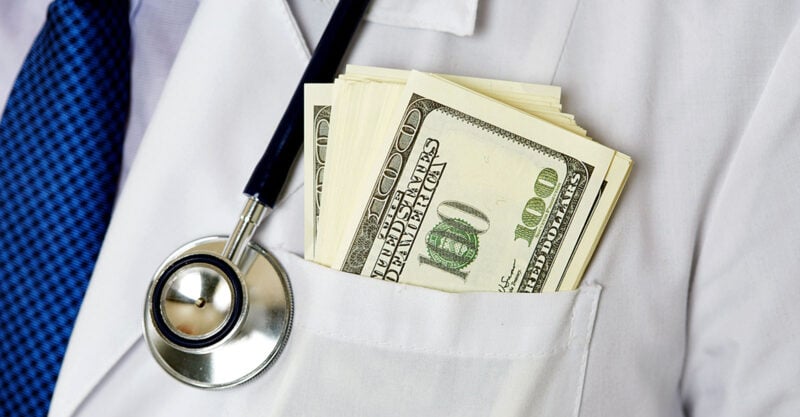by Brenda Baletti, Ph.D., Childrens Health Defense:
 Documents reveal that the federal government and insurers incentivized healthcare providers in Kentucky and California to vaccinate Medicaid patients against COVID-19 by offering bonuses based on the percentage of patients successfully vaccinated.
Documents reveal that the federal government and insurers incentivized healthcare providers in Kentucky and California to vaccinate Medicaid patients against COVID-19 by offering bonuses based on the percentage of patients successfully vaccinated.
The federal government and insurers incentivized healthcare providers in Kentucky and California to vaccinate Medicaid patients against COVID-19 by offering bonuses based on the percentage of patients successfully vaccinated.
TRUTH LIVES on at https://sgtreport.tv/
“[This is] truly sickening and I am embarrassed for my profession by this,” Dr. Meryl Nass, an internist and biological warfare epidemiologist, wrote on her Substack, where she posted several documents relating to the COVID-19 vaccine provider incentive programs.
The documents help to draw a picture of the broader effort at the federal, state and local levels to unleash a range of strategies targeting low-income and people-of-color communities, which tended to have lower vaccination rates.
The strategies included providing hundreds of millions of dollars for the creation of “culturally tailored” pro-vaccine materials and for training “trusted” and “influential messengers” to promote COVID-19 and flu vaccines to communities of color in every state.
Nass’ revelations showed these efforts went beyond advertising, fear campaigns, payments to patients and payments to trusted community actors and included, in some cases, direct financial incentives to healthcare providers.
Kentucky: Medicaid paid doctors up to $250 per vaccinated Medicaid patient
Anthem Blue Cross and Blue Shield Medicaid in Kentucky told physicians in 2021 it would “recognize your hard work by offering incentives for helping patients make the choice to become vaccinated.”
The more people vaccinated, the higher the per-person incentive.
For physicians who treated an Anthem Medicaid cohort with a minimum of 25 patients in their practice, Anthem Medicaid offered incentives for vaccination by Sept. 1, 2021, that ranged from a $20 bonus per vaccinated person for physicians who vaccinated 30% of the cohort, to $125 per vaccinated person for those who vaccinated 75% of the cohort, with several incremental steps in between.
As time went on, the rates increased.
Between Sept. 1 to Dec. 31, 2021, physicians received payments ranging from $100 per newly vaccinated person for those who vaccinated 30% of their patient cohort, to $250 per newly vaccinated person for those who vaccinated 75% of their patient cohort.
In 2022, the Anthem provider incentive program changed to a flat rate. Providers received $50 per newly vaccinated Medicaid patient. This included children ages 6 months to 4 years and kids 12 and older vaccinated between Jan. 1 and Dec. 31, 2022, and children ages 5 to 11 vaccinated between June 1 and Dec. 31, 2022.
Medi-Cal: $350 million in incentives to vaccinate low-income children, people of color
The California Department of Health Care Services (DHCS) on Aug. 6, 2021, announced $350 million in incentive payments — $250 million to providers and $100 million for direct non-monetary payments, such as gift cards, to vaccine recipients — to encourage vaccination among Medi-Cal’s 14 million beneficiaries.
Of the $350 million, $175 million came from state general funds and $175 million from federal funding. The funding period lasted from Sept. 2, 2021, through Feb. 29, 2022.
The program offered incentives to managed care plans in the name of “health equity.” In the press release, DHCS Director Will Lightborne said that raising rates among Medi-Cal beneficiaries was essential because “California will only be safe when everyone is safe.”
Nass noted that this program was rolled out one day after Centers for Disease Control and Prevention Director Rochelle Walensky told CNN the vaccines don’t prevent virus transmission. “That’s clearly a contradiction,” Nass told The Defender.
The funding targeted Medicaid recipients with low vaccine uptake — the homebound, communities of color, youth ages 12 to 25 and people ages 50 to 64 with multiple chronic conditions — and incentivized outreach and vaccination activities for providers and pharmacies.
At the time of the announcement, only 45.6% of Medi-Cal beneficiaries age 12 and over had received at least one dose of the COVID-19 vaccine, compared to over 76% of Californians overall.
The DHCS funding included payments to community-based organizations, food banks, advocacy groups and faith-based organizations. This key strategy of funding grassroots leaders to act as “grassroots” proxies spreading the federal government’s vaccine message was widespread throughout the pandemic.
Read More @ ChildrensHealthDefense.org



